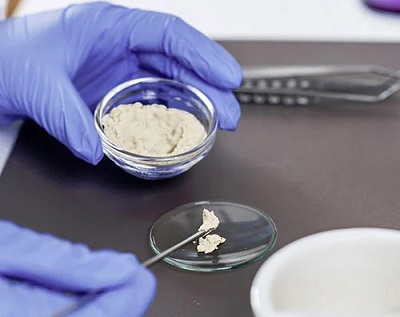Pennsylvania Study Proposes The Addition Of Methylseleninic Acid (MSeA) To COVID-19 Standard Therapy To Aid Suppression Of Cytokine Storms
Thailand Medical News Team Aug 16, 2023 2 years, 4 months, 2 weeks, 4 hours, 7 minutes ago
COVID-19 News: In the ongoing battle against the devastating effects of COVID-19, researchers at the Penn State College of Medicine and the Penn State Cancer Institute in Pennsylvania, USA, have uncovered a potential breakthrough that could significantly improve treatment outcomes. COVID-19 patients often suffer from a phenomenon known as a cytokine storm, where the immune system goes into overdrive and releases an excessive amount of inflammatory molecules, causing severe tissue damage. This has been covered extensively in validated studies and
COVID-19 News reports.

Traditional therapies have struggled to effectively combat this issue, prompting scientists to explore novel strategies. The Pennsylvania study delves into the potential of incorporating methylseleninic acid (MSeA), a specific form of selenium, into the standard therapy for COVID-19 patients, with the aim of suppressing cytokine storms and ultimately improving patient outcomes.
Selenium, an essential trace element, has long been recognized for its critical roles in various human disorders. This study builds on existing knowledge of selenium's significance, especially in the context of viral infections. Selenium supplementation has shown promise in preventing and treating a range of conditions, from Kashin-Beck disease to cardiovascular disease, and even more recently, in addressing the impacts of COVID-19.
Past Thailand
Medical News coverages have also covered various past studies that extolled the benefits of Selenium in COVID-19 and even in HIV infections.
https://www.thailandmedical.news/news/covid-19-new-american-researchers-uncover-the-importance-of-selenium-and-glutathione-supplementation-in-covid-19-as-sars-cov-2-mpro-targets-these
https://www.thailandmedical.news/news/meta-analysis-study-shows-that-antioxidant-supplements-like-vitamin-c,-vitamin-d,-selenium-and-zinc-does-help-in-covid-19-clinical-outcomes-
https://www.thailandmedical.news/news/selenium-plays-a-key-role-in-the-host-during-sars-cov-2-infections,-assisting-in-redox-homeostasis,-antioxidant-defense,-and-minimizing-oxidative-stre
https://www.thailandmedical.news/news/breaking-covid-19-drugs-university-of-chicago-study-identifies-ebselen,-a-preexisting-organoselenium-drug-as-a-poten
tial-candidate-for-covid-19-treatm
https://www.thailandmedical.news/news/covid-19-supplements-study-shows-dietary-selenium-influences-outcome-of-covid-19-disease
https://www.thailandmedical.news/news/selenium-helps-to-reduce-hiv-viral-loads-and-also-prevent-cd4-levels-from-declining
Selenium's involvement in antioxidant defense mechanisms and redox homeostasis makes it a valuable candidate for controlling excessive inflammation and mitigating the cytokine storm seen in severe COVID-19 cases.
The study focused on evaluating the effects of different selenium compounds on key players of the cytokine storm, specifically interleukin-6 (IL-6) and tumor necrosis factor-alpha (TNF-α). These cytokines play a central role in driving the damaging effects of cytokine storms in COVID-19 patients.
To simulate the inflammatory response seen in COVID-19, the study team induced inflammation in THP-1 macrophages using lipopolysaccharide (LPS). Four selenium compounds were studied: methylseleninic acid (MSeA), selenium (Sel), selenoacetic acid (SA), and selenomethionine (SM).
Among the selenium compounds tested, MSeA emerged as the most potent in reducing IL-6 and TNF-α levels. Importantly, MSeA also demonstrated the ability to modulate the activity of key cellular proteins involved in the inflammatory response, namely nuclear factor erythroid 2-related factor 2 (Nrf2) and inhibitor of kappa B alpha (IκBα). These findings suggest that MSeA could play a pivotal role in suppressing the harmful cytokine storm in COVID-19 patients, thereby reducing tissue damage and improving overall outcomes.
While previous studies have hinted at selenium's potential role in addressing the cytokine storm in COVID-19, this research adds a significant layer of depth to our understanding. The study underscores the importance of carefully selecting the appropriate selenium compound, as different forms exhibit varying impacts on cytokine levels. Furthermore, the findings shed light on the potential mechanistic pathways through which selenium can exert its anti-inflammatory effects, including the modulation of Nrf2 and IκBα.
The implications of this study extend beyond the laboratory setting. The potential of incorporating MSeA into the standard therapy for COVID-19 patients could mark a significant advancement in treatment strategies. By targeting the underlying cause of severe inflammation, clinicians may have a powerful tool at their disposal to improve patient outcomes, particularly in cases where the cytokine storm plays a major role.
The study also underscores the importance of addressing regional selenium deficiency, which has been linked to increased COVID-19 fatality rates. Countries with lower selenium levels in their soil have witnessed higher mortality rates from the virus. As such, exploring strategies to enhance selenium intake through nutritional measures or supplementation could hold promise in reducing the severity of COVID-19 in areas affected by selenium deficiency.
While this study provides compelling insights, further research is necessary to fully harness the potential of selenium-based therapies in COVID-19. Randomized clinical trials could provide a more comprehensive understanding of how selenium supplementation, particularly in the form of MSeA, can impact patient outcomes. Moreover, investigating selenium's role in supporting immune responses, including vaccination, could open up new avenues for improving overall disease management.
In conclusion, the Pennsylvania study represents a significant step forward in our understanding of selenium's potential role in addressing the cytokine storm associated with severe COVID-19 cases. By highlighting the benefits of methylseleninic acid (MSeA) in reducing IL-6 and TNF-α levels, as well as modulating key cellular proteins, researchers have uncovered a promising avenue for enhancing standard therapy protocols. The study emphasizes the importance of selenium supplementation in regions with deficiency and encourages further exploration of selenium's potential benefits in COVID-19 long haulers.
The study findings were published on a preprint server and are currently being peer reviewed.
https://www.preprints.org/manuscript/202308.1168/v1
For the latest
COVID-19 News, keep on logging to Thailand Medical News
